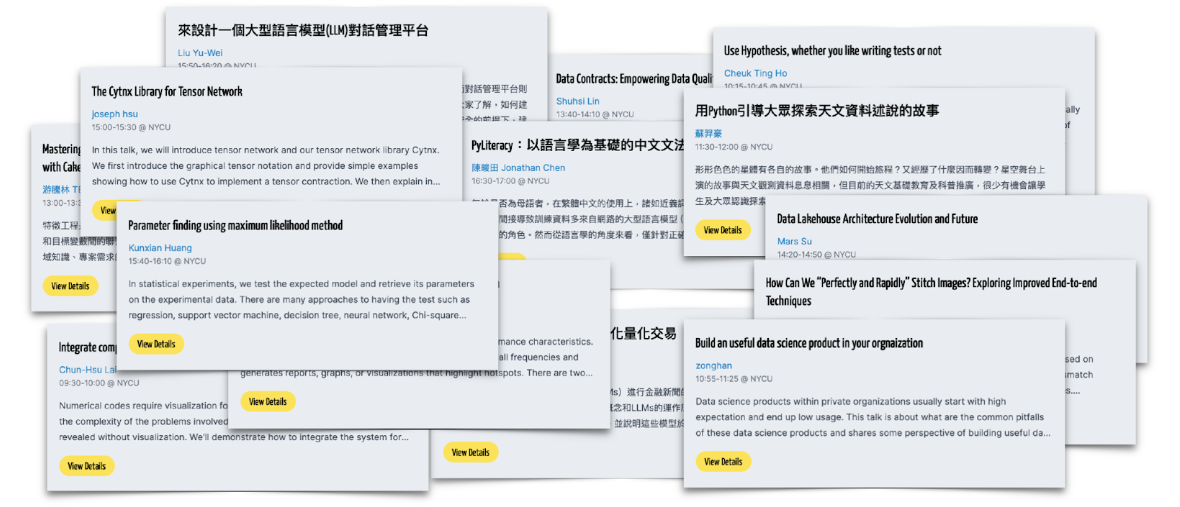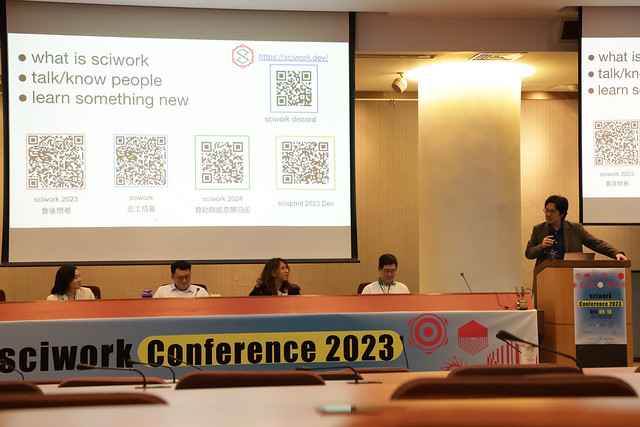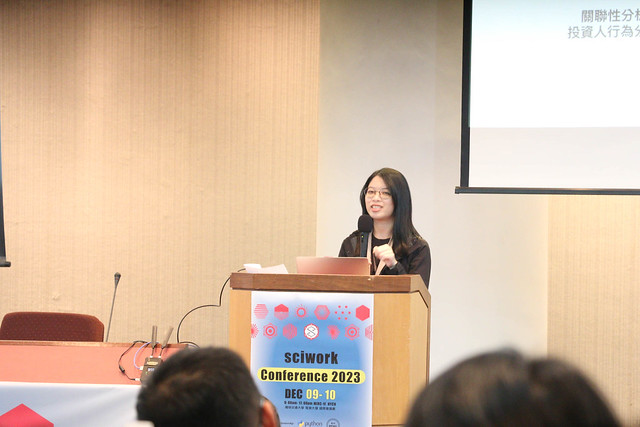First conference for scientific programming
The first sciwork conference (Hsinchu, 9th-10th December 2023) brought us a lot of fun! The conference focuses on connecting scientific programming with practical applications.
We gathered to discuss subjects for scientific programming and its applications. The 15 talks in the technical program included data engineering and science, software engineering, array and tensor code development, applications of large language models (LLM), natural language processing, graphic user interface (GUI) for numerical analysis, astrology, and image processing. It is hard to fully digest the diversified subjects, but it is exciting to see how computer code works for everything in science and engineering.
Event Album
If you missed it, check the photos at https://www.flickr.com/photos/sciwork/albums.
We will also upload the recordings once they are processed.
Humble Data
We thank all the participants, including sponsors, volunteers, and contributors. We especially appreciate NYCU CS department for their help for the venue. The conference also went with the Humble Data workshop. The full list of the program is available at https://conf.sciwork.dev/2023/program.
Scientific Programming
The community of sciwork focuses on scientific programming, which is a less visible area. Electronic computers were invented for engineering purposes, and programming for science and engineering is not only important for solving the problems, but also leads to advances to computing itself. Although the rewards are huge, it does take a lot of effort to get into the business of scientific software development.

That is why the community is very encouraged by having 72 people in the event. It is a great success to have so many enthusiastic participants in the first conference. The speakers and staff generated rich content for all attendees. People didn't simply listen. Good discussions happened during the sessions as well as outside the conference room.
Social Function
A conference cannot be a good one without the social time. Code can be written alone. (In most of the time of development, code should be written alone, undisturbed, for the quality we want.) But a good idea is rarely summoned to a bathtub. Give a group of people a comfortable place to talk and well-prepared topics, new ideas will be generated through the vibrant discussions. The community of sciwork will keep making the discussions happen. The conference is a start and a good example. The organizers are already planning for the next steps.
Technical Sharing
It would be unfair to say any of the talks is more exciting than others. But it is probably fair to say that data engineering and science is a major highlight of the conference. The technologies are used everywhere around us, for daily grocery shopping to high-tech manufacturing. Looking forward, sciwork continues to foster technical sharings and collaborative projects in all fields. Our partnerships with PyData and NumFOCUS strengthen our commitment to advancing data science and engineering. We will bring together a community of like-minded professionals to explore the technical frontiers.
A related theme in the technical program is the array and tensor libraries. Compact (contiguous-memory) arrays are essential to numerical calculations and high-performance computing (HPC). Two of the projects, uTensor and Cytnx, shared their work with us. Further development will be encouraging.
Another group of technical sharing was the work for solving partial differential equations (PDE). It is a challenging problem and involves work in multiple areas, including computational geometry, computational mechanics, numerical methods, visualization, etc.

Chun-Hsu and shock tube
Humble Data Workshop
One of the key highlights was the Humble Data workshop led by Cheuk Ting Ho. This session stood out for its focus on making data science accessible to a wider audience, including beginners. Through the hands-on activities, participants delved into real-world datasets with the guidance by data experts. The workshop not only focused on practical skills in data analysis but also fostered an inclusive environment for learning and collaboration. Cheuk and many mentors brought valuable expertise to the workshop, aligning perfectly with the sciwork mission of democratizing programming knowledge and promoting community engagement
More Code And Results
sciwork is a community for researchers and engineers to share and discuss computer code for scientific, numerical, and engineering work. We believe in the power of openness, and use open source as a means to advance software development for computational sciences. sciwork will continue to support the coding projects and promote more of them. If you have any software development work seeking collaborators, please contact us.
We are also planning for the events in the coming year (2024). If you are interested in working with us in any form, please also let us know.
You can find our contact information at https://sciwork.dev/about.














